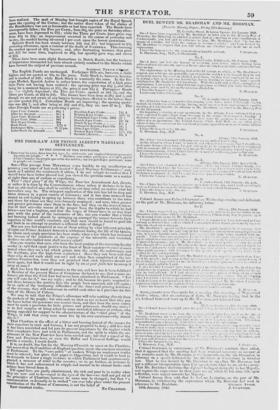THE roon-Lmv AND PRINCE ALBERT'S MARRIAGE SETTLEMENT.
TO TIIE EDITOR OP THE SPECTATOR.
" Bans tons les pays, dims tons lea ages, lest aristocrats out implacahlement poursuivi ten antis du people." • * * " Malheur aux ordres privileges, si c'est la phitAt (Ictre l'humme du people quo celui des nobles; car It's privileges perierout, main le pimple est eteruel."
Site—This passage from MR./MEAD came forcibly to my recollection on
perusing your paper of last week headed " Royal Marriage Settlements ;" and, much as I admire the sentiments it utters, I do not scruple to confess that I should have been better pleased had you viewed the question more as a matter of right than one of custom or expediency. That " chief glory" of the Whigs, the Poor-law Amendment Act, directs,
or rather it is done by the Commissioners whose orders it declares to be law, that no ahle-bodied man shall be entitled to out-door relief, no matter what his necessities may. be. The stringent application of this rule has led to deep and bitter distress in a great variety of instances ; and it has done more—it has Caused an evil feeling to spring up between those who contribute to the rates and those for whose use they were formerly employed and now, when greater and greater privations stare them in the face, and they see the avowed inten- tion of that act—the rescue of the pauper from the depths to which he had thIlen—was but a bugbear, and that the wages of labour have in no way kept pace with the price of the necessaries of life, can you wonder that a bitter and burning hatred should be springing up amongst the masses towards their superiors in this world's comforts, and that men should be found to peril life and limb in an attempt to produce a different state of things ?
Nor can you feel surprised at one of them asking by what inherent principle of right can Prince ALnEwr densand a settlement during the life of the Queen, for whom such ample provision has been made, when a lase which has increased the income of the landlords at the expense of the miserable and wretched, declares no able-bodied man shall receive relief?
Can you wonder that men, who have the least portion of the reasoning faculty
—who r r.t to!il that equal justice is the boast of their country—become a:scot:. tented when they see a law which grinds into the earth the unfortunate and the destitute, pass the high-born scatheless ? Have they not been told that those who do not work shall not eat ? and when they complained of the ini- quitous Pension-list, were they not promised that such injustice should tint occur again, but that it would not be right by an ex past facto law to sweep it away at once ?
Such has been the word, of' promise to the ear, and how has it been fulfilled? A Member of' the present House of Commons declared to me, that a more in- famous job than the Civil List had never been submitted to Parliament. " Yet you will vote for it," was my reply ; and he did, because his party required it : and thus, between the parties, have the people been squeezed, and will again ; for in spite of the increasing difficulties of the times and grossing deficiency of the revenue, they will endeavour to outbid each other in a provision for this scion of the House of Coburg.
We may be told that the Prince's allowance will take nothing directly from the pockets of the people : but who such an idiot as not to know that they pay the taxes before the pensioner can receive them and that from the same source must be made a provision for little princes and princesses, should any arrive? or to feel surprise at being asked by some unwashed labourer or artisan, who having appealed for support to the naministrators of the "chief glory" of the Whigs, is told that every man must live by his own exertions—why should this be ?
That Chartism is the effect of a bitter and burning hatred of the masses for their superiors in rank and fortune, I am not prepared to deny; still less that it has been nourished and fed into its present importance by the neglect which their complaints have met with in Parliament, and the spirit in winch the en- actments of the New Poor-law have been carried out; but that a repeal of the Corn and Provision-laws, or even the Ballot and. Universal Suffrage would provide a remedy, 1 much doubt.
It is, no doubt, fine fun for the Morning Chronicle to sneer at the Chartists, Bid assert that the Condition-of-England question meets the constant attention of' Parliament. To the ears polite ' of modern Whigs no unpleasant truths must be uttered ; but place that paper in Oppcsition, and it woulul be loud in its demands to know a single instance in Winch Parliament had spontaneously granted a measure of relief to the country ; or to go further, an instance in Which it has not endeavoured to cripple and narrow to its utmost limits such as hove been forced from it.
Till equal laws are justly administered, the rich and poor be in reality what they are now said to be—equal in the eyes of the law—we shall not get rid of the principles of Chartism, however its mune may be changed ; but that " a consummation so devoutly to be wished" can MY take place under the present constitution of the Rouse of Commons, is not the belief of


























 Previous page
Previous page